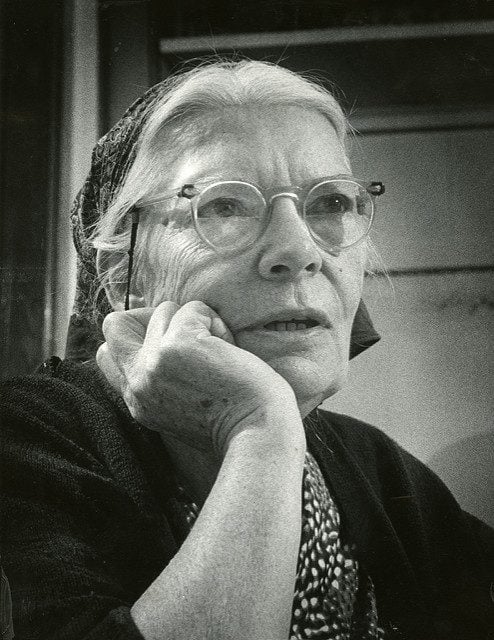
Christianity does indeed provide ultimate meaning and joyful fulfillment (and we believe it does, of course, because it is true), and this is a major reason why I have devoted my life to proclaiming and defending it: to help people not only to get on the right road to salvation, but to also obtain more joy and peace in their lives by God’s grace and the transformative power of the Holy Spirit.
I lived for ten years in my life not paying any attention to God or religion at all. I know how that outlook works (including taking in all of the massively secular outlook of public schools and sociology and psychology in college). It certainly brought me no deep happiness or joy.
Now note that I am not saying that Christians don’t suffer or have problems: even some that we never seem to be able to overcome our entire lives. No! Suffering is included in the whole thing, and we Catholics believe in redemptive suffering for the sake of others. I’ve had plenty of suffering in my life. I’m not talking some sort of “pollyanna” nonsense.
In case anyone doubts this, let me share some of it with you. My only brother Gerry died at age 49 of leukemia, when I was 39. His wife had died suddenly ten years earlier of a brain tumor. She was 38. Then Gerry shortly after lost his job, remarried, and was diagnosed with leukemia a month later. That is some serious suffering. I didn’t have to go through it, but I had to watch it.
One of my uncles, who was an Anglican priest, with five children and a very happy marriage, was senselessly murdered by a gunman in 1964 (at about 41 years old). Then in 1972 his oldest son froze to death on a camping trip up on Hudson Bay in Canada. He was 25, with a son. He’d been married for just four years. I went to his wedding in 1968.
My wife Judy has had six miscarriages. She had extreme postpartum depression after our second child in 1993 (who had colic for two years): almost to the point of suicide. Then the medication she was on for seven years was almost as bad as having depression. Blessedly, she moved off of that successfully in 2000 and has been depression-free since. But she has greatly suffered, and I have with her.
So, again, I’m not saying that we won’t ever suffer or experience any number of agonies and tragedies that anyone else does (I’ve experienced them myself), but rather, that Christianity changes one’s life for the better. It’s not all abstract. It’s about a lived life; about something better than what this world can offer: that we can share with others, as witnesses of His power and glory. Catholicism also offers the ongoing power of sacraments to help us along. They give us more grace to face the battles and trials and challenges of life.
The New Testament has plenty to say about peace, comfort, hope, and joy (follow the four links in this sentence for collections of Bible verses [RSV] about each one). These things are not merely relegated to the next life (“pie in the sky”). They’re also for this life! Being “happy”, however, is not much of a New Testament concept. It’s more of a secular notion; hence, the word only appears twice in the New Testament: though one might argue that “blessed” is a somewhat similar concept. What Jesus offers us is joy, peace, hope, and comfort in the midst of our afflictions (2 Cor 1:5).
I compiled a great deal of Scripture (way back in 1981) that would be encouraging to any Christian who is presently undergoing suffering. It has comforted my wife and I on countless occasions. I don’t think I’ve ever read that without coming away feeling much better, and able to cope. It provides strength and solace and (perhaps most importantly of all) hope.
I have contended for 37 years now, ever since I started doing apologetics and street witnessing (the first nine years of that as an evangelical Protestant), that rejection of Christianity and God will lead in the end to despair, [ultimate] meaninglessness, and nihilism. It may take many years to finally hit home, because human beings are great at diversions and covering up, but it will end there.
It’s loving on our part to say this to non-believers. We have something to share with them: not out of felt superiority or spiritual arrogance or naivete, but out of love. We share about the blessings of God because we have experienced them ourselves, and want others to experience them, too: as many as possible.
I feel so much for people who are in despair, or struggling every day to get through life. I’ve been there. I deal with depression in my family every day and have, most of my life. I went through one very severe, clinical period of depression for six months in 1977. It was truly a period of hopeless, existential despair and agony and torment. I have never had it since (I became an evangelical Protestant and devoted my life to Christ as His disciple in the middle of it). But I’ve been constantly around it.
My entire family (six people) has struggled with serious depression at one time or another, and so I am very concerned about it. As with gun violence and many other social problems, our society needs to figure out what is going on and try to do something about this (up to and including rapidly rising rates of suicide). We can learn as a society to help people who suffer from serious depression.
I think Christianity (yes, including all its moral teachings and precepts) clearly plays a role in providing hope and meaning. And I think good counseling and the proper medication can make a world of difference. It’s not either/or. God gave scientists and doctors and therapists the knowledge and wisdom to discover cures and to heal. Praise God for that! Again, I’ve seen the positive results in my own family: with medication immensely helping three people who suffered from depression and/or anxiety and other conditions. The blessings of modern medicine can help [biochemical] things beyond a person’s control.
We are our brother’s keepers. Life can be so much better and can have a deep, fulfilling, rewarding meaning. God has a plan for every one of us. It sounds like a cliche, but He does (1 Corinthians 12:11 [RSV]: “All these [gifts] are inspired by one and the same Spirit, who apportions to each one individually as he wills”). We’re never truly happy unless we are wholeheartedly serving Him, or at least trying, seeking our best to do so (we fall a lot, and repent, of course).
Love the people around you! Share the Good News with them, and help them get the assistance they need if they are struggling with depression, mental illness, or substance abuse, or anything else. Walk beside them. Be there for them. And do good works of many sorts: reaching out to help your fellow human beings. The Christian (and especially the Catholic Christian) way of life is the best way to become more fulfilled and at peace: operating within a meaningful framework with which to go through life, with all its ups and downs and unpredictable turns. I reiterate that the Good News (the Gospel) is not only about ultimate (“eschatological”) salvation and the next life, but also about transformed lives in this life; on this earth.
Romans 12:1-3 I appeal to you therefore, brethren, by the mercies of God, to present your bodies as a living sacrifice, holy and acceptable to God, which is your spiritual worship. [2] Do not be conformed to this world but be transformed by the renewal of your mind, that you may prove what is the will of God, what is good and acceptable and perfect. [3] For by the grace given to me I bid every one among you not to think of himself more highly than he ought to think, but to think with sober judgment, each according to the measure of faith which God has assigned him.
2 Corinthians 5:17 Therefore, if any one is in Christ, he is a new creation; the old has passed away, behold, the new has come.
Matthew 5:11-16 “Blessed are you when men revile you and persecute you and utter all kinds of evil against you falsely on my account. [12] Rejoice and be glad, for your reward is great in heaven, for so men persecuted the prophets who were before you. [13] “You are the salt of the earth; but if salt has lost its taste, how shall its saltness be restored? It is no longer good for anything except to be thrown out and trodden under foot by men. [14] “You are the light of the world. A city set on a hill cannot be hid. [15] Nor do men light a lamp and put it under a bushel, but on a stand, and it gives light to all in the house. [16] Let your light so shine before men, that they may see your good works and give glory to your Father who is in heaven.”
Related reading:
*
***
Photo credit: Dorothy Day (1897-1980): photo taken by the Milwaukee Journal in February 1968; posted by Jim Forest [Flickr / CC BY-NC-ND 2.0 license]
***













